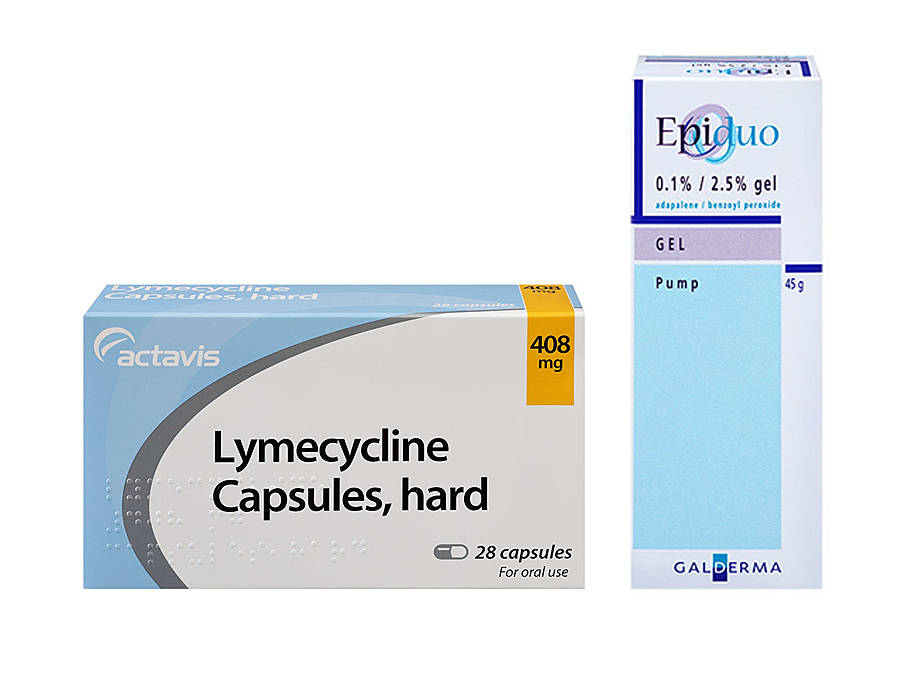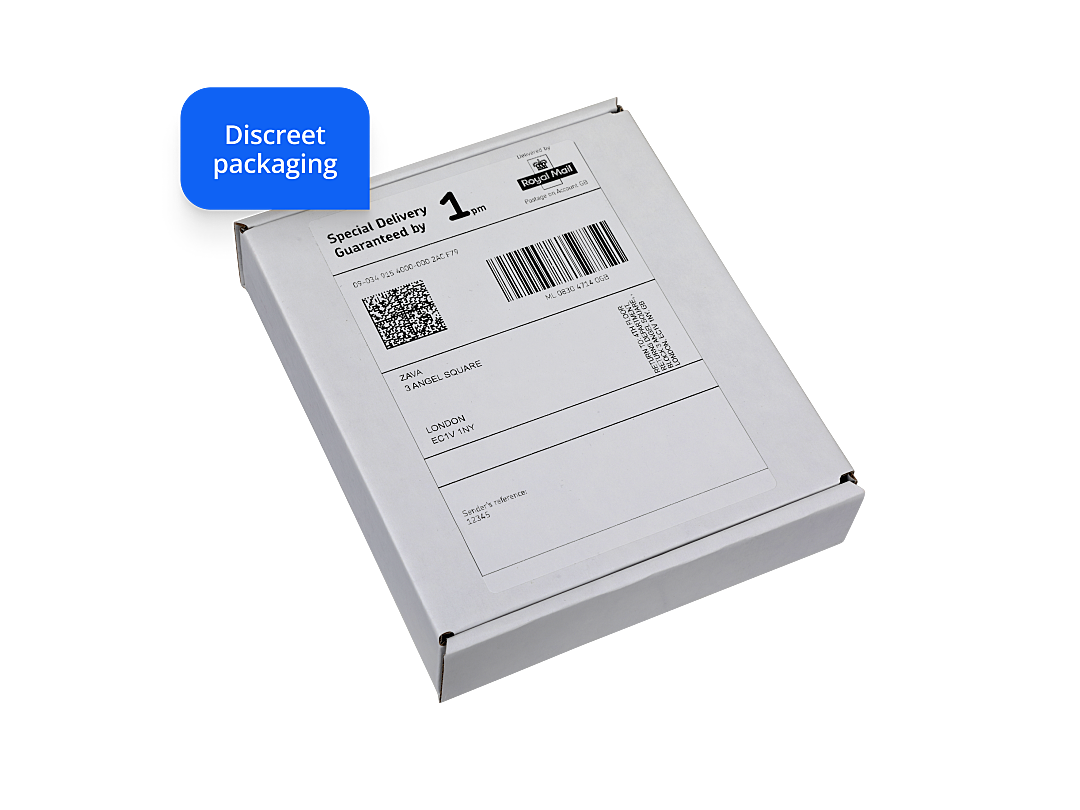Lymecycline and Epiduo
Request lymecycline and Epiduo online for acne with free, fast and discreet delivery




Prices from £66.99
In stock. Simply fill in a brief consultation questionnaire and one of our doctors will review your request today.
-
Lymecycline is an oral antibiotic used to treat acne. The active ingredient lymecycline works by stopping bacterial growth on your skin.
Lymecycline is available as 408mg capsules and is taken once daily. Lymecycline 408mg is also available under the brand name Tetralysal 300mg capsules.
Lymecycline is always used along with a topical treatment, like Epiduo gel.
Epiduo gel is a topical gel used for acne treatment. It can be used on its own or with lymecycline capsules. Epiduo gel contains 2 active ingredients: adapalene and benzoyl peroxide.
You can apply Epiduo gel once a day in the evening. Both Epiduo gel and lymecycline should be used for 3 months as a full treatment course.



About Lymecycline and Epiduo gel
-
-
Lymecycline is a tetracycline-type prescription-only antibiotic used to treat moderate or severe acne. Lymecycline works by stopping the growth of bacteria in your skin.
By killing these bacteria called Propionibacterium acnes, lymecycline allows acne to heal and prevents new inflamed whiteheads from forming.
What is Tetralysal 300?
Tetralysal is a branded medication made by the manufacturer Galderma. Tetralysal contains the active ingredient Lymecycline and therefore works exactly in the same way. Whether you‘re taking lymecycline or Tetralysal, the same instructions apply and both are equally effective in treating acne.
-
-
Epiduo gel contains adapalene and benzoyl peroxide. Adapalene reduces the inflammation in the pores of your skin. It also exfoliates your skin to get rid of dead skin cells.
Benzoyl peroxide works as an antibacterial and reduces inflammation by getting rid of the bacteria that cause acne.
-
-
You can take 1 lymecycline capsule every day with a glass of water.
What if I forget a dose?
As lymecycline is an antibiotic, you are strongly advised to take it regularly and as you have been advised. If you forget to take a tablet, please take it as soon as you remember, then continue with the next tablet at the normal time. If the next pill is due by the time you remember, just take one.
-
-
When using Epiduo gel:
- make sure your hands are washed and dry
- apply a small amount of gel to the affected areas of your skin
- apply once a day in the evening.
You can apply Epiduo on your face or the trunk of your body. Make sure the skin is not broken or bleeding before you apply the gel. You can apply makeup after the gel has dried completely.
Avoid applying the gel to your eyes or lips. If this happens, wash the area with plenty of warm water.
-
-
Lymecycline works by slowing down the growth of bacteria. The main bacteria that builds up in acne is Cutibacterium acnes (also known as Propionibacterium acnes).
All cells need proteins to continue to function, grow and multiply. Lymecycline stops the bacteria cells from producing proteins which stops their growth. The bacteria eventually die off as they cannot survive. Bacterial cells are different to the cells in your body, so lymecycline will not harm your own cells.
The ingredients in Epiduo gel work in several different ways:
- as an antibacterial
- reducing inflammation
- slowing down the rate your skin cells are produced, which reduces dead skin cells
As acne can happen due to several different mechanisms, your treatment must be able to target each pathway. This is even more important if you have moderate or severe acne.
You’ll be prescribed a 3 month course of lymecycline and Epiduo gel to complete. It’s important to use the medications regularly every day to make sure the bacteria do not have a chance of growing back.
-
-
Lymecycline and Epiduo gel are effective in treating acne when used regularly. You’ll start to see improvement within the first few weeks of use. You should continue to use the medications for the whole course, which is usually around 3 months. It can take some time for your skin to heal so remember to be patient with the process.
If you do not see any improvement within 8 weeks of treatment, speak to your doctor.
-
-
Lymecycline side effects
You may experience some side effects when taking lymecycline. These are usually temporary and will disappear within a few hours or days.
The common side effects of lymecycline are:
- feeling sick
- pain in your abdomen
- diarrhoea
- headaches
You can find more information on the side effects of lymecycline in the patient information leaflet.
Epiduo side effects
As you are applying Epiduo gel directly to your skin, you may experience some skin irritation.
Some more common side effects of Epiduo gel are:
- eczema
- burning sensation on your skin
The uncommon side effects of Epiduo gel are:
- tingling sensation at the application site
- rash
- dry skin
- redness of the eyelid
To find out more about the side effects of Epiduo gel, read the patient information leaflet that comes with your pack.
If you have an allergic reaction to any of the medications, stop using them and contact 999 immediately. Signs of an allergic reaction include difficulty breathing, swelling of the face, lips, eyes or throat or feeling faint.
-
-
Both lymecycline capsules and Epiduo gel can be used by adults and children over 12 if they have moderate or severe acne.
You should not use either lymecycline or Epiduo gel if you are:
- allergic to their ingredients
- breastfeeding
- pregnant or are planning to get pregnant
If you become pregnant while using any of these medications, stop the treatment and speak to your doctor immediately.
You should also speak to your doctor before taking lymecycline if you:
- have kidney or liver problems
- have systemic lupus erythematosus, an autoimmune condition
- myasthenia gravis, a condition that causes muscle weakness
Your doctor may advise an alternative treatment.
-
-
Each lymecycline tablet contains 408mg of the active ingredient of the same name. Additional ingredients include magnesium stearate, colloidal silica, gelatin, titanium dioxide, erythrosine, quinoline yellow and indigo carmine. Lymecycline tablets are usually hard gelatin capsules with a blue cap and a white body.
Epiduo contains adapalene and benzoyl peroxide, and also disodium edetate, docusate sodium, glycerol, poloxamer, propylene glycol (E1520), simulgel 600PHA, and purified water.
-
-
Lymecycline can interact with other medications you might be taking. This can reduce the effectiveness of either lymecycline or your other treatments.
Speak to your doctor or pharmacist if you are taking:
- other acne treatments
- blood thinners such as warfarin
- diuretics (also known as water tablets)
- lithium, used to treat mood disorders
- indigestion remedies
- epilepsy treatment such as carbamazepine or phenytoin
- quinapril for high blood pressure
- other antibiotics, especially penicillins
When using Epiduo gel, make sure you use it at a different time to other cosmetic products that might irritate your skin. You should also avoid using other products that contain adapalene or benzoyl peroxide.
Epiduo gel can make your skin more sensitive to sunlight, so avoid being too exposed to the sun or UV lamps.
-
-
If lymecycline or Epiduo gel are not for you, there are several alternative acne treatments you can try. Most treatments will work in a similar way.
- Oxytetracycline is in the same family of antibiotics as lymecycline. Sometimes using an alternative antibiotic can improve treatment. Bacteria can adapt and mutate if you use the same antibiotic for too long.
- Differin gel is another topical treatment that contains only adapalene. You can use this if you have mild acne or if you cannot use benzoyl peroxide.
- Zineryt lotion is a combination treatment that contains erythromycin (an antibiotic) and zinc. Zinc helps erythromycin to be absorbed into the skin and reach the bacteria in your pores.
You can buy Acnecide gel over the counter from your local pharmacy. Acnecide contains benzoyl peroxide only.
Sometimes, using an oral contraceptive pill can help reduce your acne. The contraceptive pill can also cause acne as a side effect due to the changing levels in hormones. If you are a woman, you can speak to your doctor about trying the pill to treat acne.
If your acne is particularly severe and hard to treat, speak to your doctor. They can refer you to a dermatologist who may consider prescribing isotretinoin. Isotretinoin is a specialist medication that requires regular monitoring. Isotretinoin is also known under the brand name Roaccutane.
-
-
Acne happens when the hair follicles in your skin become inflamed and infected. This occurs when there is a build up of dead skin cells, sebum (oil) or bacteria. Sebum is the natural oil produced by your sebaceous glands. It keeps your skin moisturised and supple. If you have acne, your glands will overproduce sebum.
Having acne does not mean your skin is dirty; in fact, trying to clean your skin too often can make acne worse.
When this debris builds up in your hair follicles, the inflammation can cause pimples to form. These pimples can come in different forms, such as:
- blackheads and whiteheads
- papules
- pustules
- nodules
- cysts

Dr Babak Ashrafi Clinical Lead for Service Expansion
Accreditations: BSc, MBBS, MRCGP (2008)
Babak studied medicine at King’s College London and graduated in 2003, having also gained a bachelor’s degree in Physiology during his time there. He completed his general practice (GP) training in East London, where he worked for a number of years as a partner at a large inner-city GP practice. He completed the Royal College of GPs membership exam in 2007.
Meet our doctorsLast reviewed: 07 Jun 2022
-
Tetralysal 300mg Hard Capsules, Summary of Product Characteristics, EMC [accessed June 2022]
-
Epiduo gel, Summary of Product Characteristics, EMC[accessed June 2022]
-
Epiduo 0.3% / 2.5% gel, Summary of Product Characteristics, EMC [accessed June 2022]
-
Lymecycline, NICE/British National Formulary [accessed June 2022]
-
Acne causes, National Health Service [accessed June 2022]
ZAVA offers a range of options to manage acne symptoms, including antibiotics, anti-inflammatories for inflamed skin, and combination treatments that include Zinc to help skin repair.








